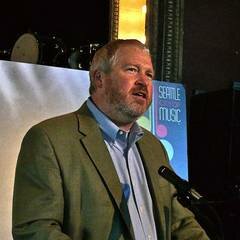Everybody was watching Apple this morning, awaiting the big announcement: would the iBeast finally launch their web-streaming subscription service? 'Fraid not, but almost as good--at least for fans of John, Paul, George, and that other one (Just kidding! We love you, Ringo!)--Apple and Apple Corps Ltd., the label that owns rights to much of The Beatles' repertoire, have come together after years of helter-skelter copyright disputes. As of today, the band's catalog is finally available on iTunes. That means a lot.
Closer to home, this week the Seattle Public Library switched its online catalog to software from BiblioCommons, a Canadian company. The new system has all the features of the old, with none of the bugs. It also looks great and comes with social media features that will appeal to younger readers. BiblioCommons allows users to share favorites on Facebook and Twitter, as well as interact within the BiblioCommons community. The new interface is fairly simple, but there is a how-to video available on YouTube for noobs. Patrons will need to create a username the first time they log on.
In a story just begging for a tasteless joke, Newsweek and The Daily Beast have merged. Tina Brown will become editor-in-chief of both, making her the first female editor of Newsweek. Separately, the two companies have been hemorrhaging cash, almost $40 million dollars in 2010. The new Newsweek Daily Beast Co. hopes to stanch the flow, but insider consensus seems to agree that this will not end well.
And yet another: Hugh Hefner has taken a page from Willy Wonka and is offering 10 "golden tickets" to the Midsummer Night's Dream Party at Playboy mansion. Tickets are hidden in ten random newsstand copies of the venerable titty mag. This is the first time Playboy has offered access to a party to readers. I, for one, think it's hysterically funny and hope that at least one winner sends their ticket to Gloria Steinem. Or Sarah Palin.
In case that left a bad taste in your mouth, or a scary picture in your brain, here is a little video to brighten up your day: Marcel the Shell (with shoes on.) Like a puppet, only smaller.
I recently finished your second novel, How to Read the Air, which was released yesterday. It was okay. Good, but not great. Normally, I would have no problem reviewing it on its own merits, and recommending that people go see you talk at the Seattle Public Library on Monday, October 18th.
I think books like How to Read the Air are important. I strongly believe that stories of diaspora, of separation and uncertain communion, need to be told. I believe that we, as societies experiencing an unprecedented global diaspora, need to hear the noise of cultures clashing. I want writers to write the stories, publishers to publish them, and readers to read. I believe in the importance of having the conversation with the fiery passion of a thousand burning optimists.
Which leaves me with a dilemma. I'm tasked with giving my largely introverted and antisocial neighbors a reason to leave the house, despite uncertain weather and unreliable drivers, not to mention that the Seattle Lesbian and Gay Film Festival is running next week. It's a big responsibility.
I loved your first novel, The Beautiful Things That Heaven Bears. It was one of those books that comes around rarely, a story that fundamentally affects one's perceptions. When I finished Beautiful Things, I saw the world differently than I had before I started. I had greater compassion for my fellow humans. It was, indeed, a beautiful thing.
How to Read the Air is not as well crafted, or as interesting. Although How to Read the Air explores the same themes as The Beautiful Things That Heaven Bears--the immigrant experience, specifically of Ethiopians in America--the language is not as concise and distinct in your second novel. All of the adjectives and metaphors cut from Beautiful Things seemed to have fled to How to Read looking for work and boy, howdy! did they find it....
"As of late last year, only 28 percent of small businesses were using bank loans, the lowest rate since 1993," notes the Seattle Jobs Plan, unveiled yesterday by Mayor McGinn.
A chunk of the $50 million in business financing that the city plans to distribute within an 18-month window will go to start-ups and small- and medium-sized businesses looking for loans to help them invest in operations or expand.
Millions more in tax exempt stimulus bonds and tax credits are targeted at large businesses, with a priority given for "projects that create or retain permanent jobs, increase the availability of goods, and serve as an anchor for future economic development in low-income communities."
It's a plan that seems to include the kitchen sink--job training and preparation for college is in there ($2 million), interim parking lots near light rail stations, street food vendors, a city-owned broadband network expanded to homes and businesses, urban farming, and energy-efficient retrofitting ($26 million).
Totaling it all up, the city expects to create around 10,000 jobs in the next few years, reports Seattlepi.com, while it's not really on the hook for much of the financing: "roughly $70 million for business loans and tax credits come from new federal funds and leveraged local dollars from partnerships."...
"Public Library 1" courtesy of The SunBreak Flickr pool member Jeff Blucher
There was muted celebration at the Friends of the Seattle Public Library blog last week, after the Seattle City Council voted to add back $863,000 to the library's funding. Besides keeping library doors open longer, the money will allow the library to reinstate 27 staff positions that had been cut.
Besides the Seattle Central Public Library, the open-seven-days-a-week branches will be Ballard, Beacon Hill, Broadview, Capitol Hill, Douglass-Truth, Greenwood, Lake City, Northeast, Rainier Beach, Southwest, and West Seattle.
Columbia, Delridge, Fremont, Green Lake, High Point, International District/Chinatown, Madrona-Sally Goldmark, Magnolia, Montlake, NewHolly, Northgate, Queen Anne, South Park, University, and Wallingford branches will be open only five days per week, with only one weekend day: Saturday, 10 a.m. to 6 p.m.
The Seattle Times reports that while $863,000 sounds like a lot, the library is still facing an operating budget cut of $1.77 million for 2010. Mayor Nickels' budget called for a $2.6-million budget reduction. At this point, the library is planning another week-long furlough for next year as well.
To make matters worse, that doesn't include a 37 percent gouging of the library's 2010 capital budget, down to about $1 million from $1.6 million this year. The capital budget pays for major maintenance of the library buildings, so losing almost 40 percent will result in a visible difference in library standards.



Most Recent Comments